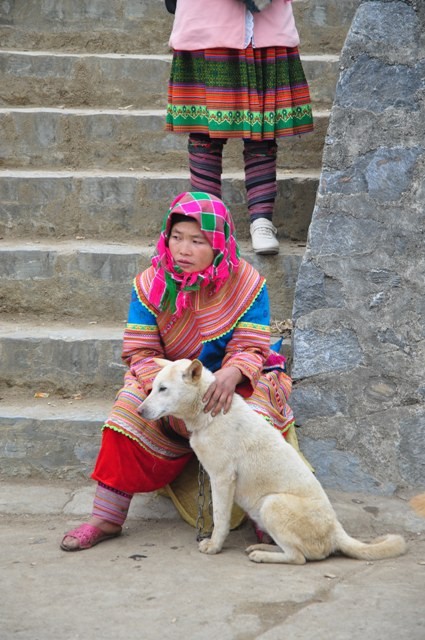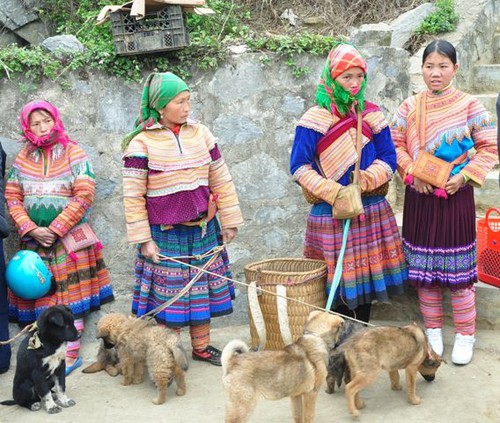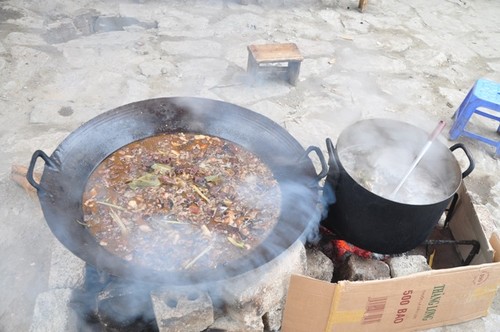(VOVworld) – Five years ago, Bac Ha market in Lao Cai Province was selected by Serendib magazine of Sri Lanka as one of Southeast Asia’s 10 most famous markets. Due to rapid modernization, many markets have lost their authenticity, but Bac Ha market still retains its identity and uniqueness. Today, in Discovery Vietnam, we will take you on a tour of the market.
As the market meets every Sunday, you are advised to take the train from Hanoi on Saturday night in order to arrive at Lao Cai at 5am. It takes seven hours to travel 350 km! But to get to Bac Ha, you still need to go another 60 km by bus.
The road to Bac Ha district is bordered by terraced rice fields, magnificent mountains and the stilt houses of ethnic minority people. If you are an adventurer, the scenery here is what you want. Since early morning, along the road to Bac Ha, local ethnic people in their traditional costumes on horseback, on foot and sometimes on motorbike, carry goods to the market.
 |
Bac Ha district is inhabited by 14 ethnic minority groups, predominantly H Mong, Dao, Tay and Nung. Bac Ha market is not only a trading place, but also a venue for cultural exchanges among local people. Lu Van Dao of the Nung ethnic group said that previously, the market was held on a hill in the center of town. In recent years, due to increasing demand for trading and tourism, the old market has been replaced by a new larger market. Lu Van Dao says: "The market is held on Sundays, so everybody can come because the other days of the week, people have to go to work. My family sells Thang Co, buffalo meat and pork in the market. This business is more profitable than agriculture".

The market is divided into different sections offering different products for sale, but the most crowded corner is the culinary one. Visitors to Bac Ha market often try Thang Co, a soup made of horse viscera flavored with local spices. This is a traditional dish of the Mong ethnic minority. Today, Thang Co is also prepared with the viscera of other animals such as goats or cows but it still appeals to both locals and visitors. To enjoy Thang Co with more authenticity, connoisseurs accompany it with a glass or two of corn alcohol. Lu Van Tinh owns a Thang Co restaurant and says he often sells two big pans of Thang Co a day: "I prepare this dish myself using horse viscera. It takes time for this dish to cook. Each bowl of Thang Co costs between 2 and 2.5 USD".
 |
Bac Ha market is also a place for local people to trade buffalos and horses. Local people come to the market to buy strong horses to help them do farm work and fast ones to enter the district’s horse race. Thao Seo Cau is Vice Chair of the Bac Ha District People’s Committee: "The Mong consider the horse a family member because it helps them a lot. At the beginning of the New Year, young men from the Mong, Tay, and Dao groups compete in a horse race to show their courage and pray for good luck for the New Year”.
The market also sells houseware and tools. The most popular stands sell jewelry, clothing, and brocaded fabrics. Giang Thi Sao, who lives in Hoi Na commune, says she is looking for a wedding dress for her daughter: "I want to buy this dress because it is very beautiful. Because were busy in the fields, we have no time for weaving. This dress is well made. I hope my daughter will love it. "
Bac Ha market is one of the few that still maintains the authenticity and uniqueness of a mountain market session. Visiting the market is an opportunity to discover the local culture.
Vinh Phong